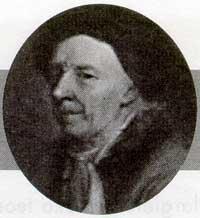Euler, Leonhard
(1707-1783)
Swiss mathematician born in Basel on 15 April 1707. He learned mathematics from his father. He was sent to Basel to study theology. In it, Jacques I. He taught the Swiss sage Bernouilli (who was the same teacher as his father) and became a great friend of his children. They went to St. Petersburg (Russia) in 1732, at the request of the empress of Catherine Russia and took Euler with them. There he began to work in the chair of mathematics.

In 1735, due to brain congestion, he lost sight of an eye. The following year he wrote the Complete Treatise on Mechanics. There he applied mathematical analysis to the science of movement. In 1741, Frederick II went to Berlin invited by the king of Denmark and Norway to give some strength to the Academy of Sciences. At that time he wrote the Theory of Isoperimeters. The curves could be determined by the theory bars. Along with this book, he wrote the Theory of the Movement of Comets and Planets and the Theory of Imantation, which solved the king of Prussia the problems of ballistics. Years later he wrote two other books: Introduction to Infinitesimal Calculus (1748) and Differential Calculus Institutions (1755).
In 1766 he returned to St. Petersburg. That same year he lost his sight of good eye. But Euler did not stop working. Between 1768 and 1770 appears the book Institutions of Integral Calculation.
He applied his mathematics to astronomy, reaching the nature of some disturbances. He pioneered the theories of Euler Laplace and Lagrange.
His greatest work was the theory of the Moon, that is, the analysis of the concrete motion of the Moon. Despite the fact that the results were not correct, progress was considerable. He also indicated that light was a waveform and that color depended on wavelength. A century later, these statements were confirmed by the British scientist Young.
He died in St. Petersburg on 18 September 1783 for an attack of apoplexi.
Buletina
Bidali zure helbide elektronikoa eta jaso asteroko buletina zure sarrera-ontzian











